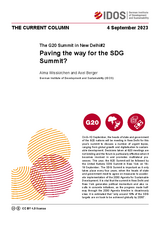The G20 Summit in New Delhi
Paving the way for the SDG Summit?
Wisskirchen, Alma / Axel BergerThe Current Column (2023)
Bonn: German Institute of Development and Sustainability (IDOS), The Current Column of 4 September 2023
On 9–10 September, the heads of state and government of the G20 nations will be meeting in New Delhi for this year’s summit to discuss a number of urgent topics, ranging from global growth and digitalisation to sustainable development. Decisions taken at G20 meetings are not binding and the forum is particularly effective when it becomes involved in and promotes multilateral processes. This year, the G20 Summit will be followed by the United Nations SDG Summit in New York on 18–19 September. The SDG Summit is important as it only takes place every four years, when the heads of state and government meet to agree on measures to accelerate implementation of the 2030 Agenda for Sustainable Development. It is vital that the summits in New Delhi and New York generate political momentum and also result in concrete initiatives, as the progress made halfway through the 2030 Agenda timeline is disastrously slow: it is estimated that “only around 18% of the SDG targets are on track to be achieved globally by 2030”.
The G20 comprises 19 economic powers and the European Union – together, they account for 80 per cent of the global economy but are also responsible for 80 per cent of global greenhouse gases. Launched to solve the global financial crisis in 2008, the G20 has become one of the most important forums for tackling global challenges. Growing geopolitical rivalries and a crisis of trust have become very obvious as a result of Russia’s war in Ukraine and are placing a strain on the G20’s thematically focused discussions – despite repeated explicit reminders by individual G20 member states that the group was designed not to resolve geopolitical issues but rather to focus on the topics of growth and development.
Against the backdrop of geopolitical tensions, how can the G20 Summit make a constructive contribution to the SDG Summit? Three key topics should be emphasised: SDG financing, national implementation of the 2030 Agenda and reform of the multilateral system.
The meetings of the G20 line ministers to date provide an initial impression of where the group currently finds itself in the run-up to the New Delhi Summit. There continues to be a clear, general commitment to the 2030 Agenda. The Indian presidency refers to it as a key system of objectives, emphasising the G20’s responsibility for implementing it. Many see the 2030 Agenda primarily as an investment agenda. UN Secretary-General Guterres called on the G20 to launch an SDG Stimulus with a view to generating public and private funding for implementing the 2030 Agenda, while measures such as “debt-for-SDG swaps”, for example, are designed to result in debt relief. In this context, the G20 development and foreign ministers emphasise that innovative new financing is required to implement the 2030 Agenda. In their outcome document, the finance ministers routinely reiterate the industrialised nations’ obligation to mobilise USD 100 billion a year in financing for climate action to support low-income countries. It is sobering to see that even though the need for financing is actually considerably higher, this obligation has still not been met. The finance ministers are at least in favour of deliberating on a more ambitious goal for climate finance, however, but little progress has yet been made in connection with debt relief – an area of such importance to many low-income countries.
Despite the fact that the G20 ministers prioritise the 2030 Agenda in their final declarations, important measures to implement key SDGs are lacking. Even the economic powerhouses in the G20 are lagging behind in their national implementation, while existing production and consumption patterns are leading to negative spillover effects, which are making it more difficult to implement the SDGs in other countries. Financial or political commitments, for example to tripling renewable power capacity by 2030, are not mentioned in the outcome document issued by the G20 energy ministers. With regard to the phasing out of fossil fuels, too, the outcome document merely mentions existing differences between the G20 member states, thus providing further evidence that the G20 still has a long way to go in phasing out fossil fuel subsidies.
Even though expectations concerning the results of the G20 Summit are therefore largely modest, reform of multilateral structures and of the G20 itself is possible. The G20 is playing a key role in discussions about reforming the World Bank, for example. In their outcome document, the G20 foreign ministers support a “more inclusive and reinvigorated multilateralism”. Many G20 members states also advocate the inclusion of the African Union (AU). At the same time, the BRICS group, an alternative alliance of the major economies of the Global South, is set to admit new members. An enlarged BRICS could also become more influential and could enable China to play an even greater role. Admitting the AU to the G20 would be an important step to prevent the formation of a bloc against BRICS.
The G20 process certainly creates a mixed impression. In many contentious areas, the lack of trust among the key actors persists, making it more difficult to achieve decisive progress in implementing the 2030 Agenda. Without specific policy initiatives by the heads of state and government in New Delhi, however, the necessary political momentum for the SDG Summit in New York would become a more distant prospect. That would be a missed opportunity, because although we are halfway through the 2030 Agenda, we are far from halfway to achieving its implementation.



